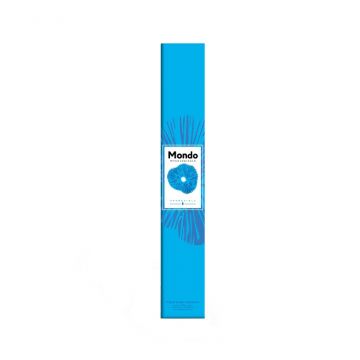Magic Mushrooms Spores
🌱 Ready to experience the cultivation process from the very beginning? Our magic mushroom spores give you the opportunity to follow the wonder of mushroom growth step by step. These tiny yet powerful spores contain everything needed to grow your very own magical mushrooms. 🌿 Whether you're an experienced grower or just getting started, spores offer a unique experience where you can witness the full life cycle of a mushroom. Start with something small and eventually enjoy a rich harvest! 🍄
Engaging blogs about Magic Mushrooms Spores

Supersnelle levering. Zondag besteld, maandag al in huis!
Goede service.Snelle levering.Top!
What Are Magic Mushroom Spores
Magic mushrooms, often referred to as shrooms, are unique fungi known for their consciousness-altering effects. Spores are the “seeds” of these mushrooms, filled with the genetic material needed to grow new mushrooms. Unlike typical seeds, these spores are microscopic and require specific conditions to grow into mature mushrooms. 🍄
Did you know? Magic mushroom spores aren't just used by growers—they're also a popular subject of scientific research, particularly in microscopy and fungal studies.
The Basics of Magic Mushrooms and Their Spores
The life cycle of a mushroom begins with spores. These are often collected using a spore print from a mature mushroom, a method that captures spores on paper or foil. Spore prints can be stored for future use, whether for cultivation or research. With a single spore print, you can start multiple grows.
What Makes Magic Mushrooms Unique
Though magic mushrooms belong to the fungal kingdom, they differ from most edible or medicinal mushrooms due to their psychoactive compounds. Not all fungi produce psychoactive spores; magic mushrooms contain psilocybin, the compound responsible for their hallucinogenic effects.
Growing Magic Mushrooms from Spores
If you want to grow shrooms, you’ll need a few essential components: spores, a nutrient-rich substrate like grain or rice, and a sterile environment. The process from inoculation to harvest takes several weeks.
Steps to Grow Mushrooms from Spores
- Collect spores using a spore print or syringe.
- Inoculate the spores onto a suitable substrate.
- Allow the mycelium to develop with proper care and patience.
- Maintain humidity and temperature for optimal growth.
- Harvest when the mushrooms are fully matured.
Common Mistakes in Mushroom Cultivation
- Lack of sterility: Contamination can ruin a grow.
- Wrong temperature: Spores need specific warmth to germinate.
- Impatience: Growth takes time—don’t rush it.
Different Types of Magic Mushroom Spores
There are many species of magic mushrooms, each with unique spores and growth requirements. Psilocybe cubensis is the most well-known, but there are many others to explore.
Popular Spore Types
- Psilocybe cubensis: Easy to grow, reliable yields, ideal for beginners.
- Psilocybe semilanceata: Also known as "Liberty Cap", a common wild species.
- Psilocybe azurescens: Known for strong effects, but harder to cultivate.
“The diversity of magic mushrooms makes cultivation fascinating. Each strain has its own personality and growth pattern.”
Collecting Magic Mushroom Spores
Collecting spores is essential to continue the mushroom life cycle and keep cultivating new batches. Be careful, as contaminated spores can hinder growth.
How to Collect Mushroom Spores
One of the most common methods is creating a spore print. This involves placing the cap of a mature mushroom on a sterile surface and allowing the spores to drop.
- Select a mature mushroom and carefully remove the stem.
- Place the cap on sterile paper or foil.
- Cover the cap and wait 24 hours for the spores to release.
- Remove the cap and store the spore print in a sterile bag or container.
Pro tip: Always work in a sterile environment to prevent contamination and ensure future grows are successful.
Sterile Techniques for Spore Collection
Contamination is a major challenge in mushroom cultivation. Always work in a clean space, use gloves and a mask, and consider a still-air box for even better results.
| Benefits of Sterile Work | Why It Matters |
|---|---|
| Reduces contamination | Fungi and bacteria can disrupt mushroom growth |
| Preserves spore viability | Protects spores from harmful conditions |
| Improves harvest quality | Cleaner environments yield healthier mushrooms |
Storing Magic Mushroom Spores
Proper spore storage is crucial. Spores are sensitive to moisture, light, and heat, so they must be kept in optimal conditions.
How and Where to Store Spores
Store spores in a spore print or sterile syringe. Keep them in a cool, dark place—like a refrigerator—away from air and humidity. This helps maintain viability for future use.
Why Sterile Storage Is Essential
Sterility is key to storing spores. Exposure to air or moisture can lead to contamination and render the spores unusable.
“Good storage begins with sterile technique—the foundation for successful cultivation.”
The Importance of a Clean Workspace
Working with fungi always carries a contamination risk. A clean space reduces the chance that bacteria or mold will interfere. Regular cleaning, sterile tools, and protective gear like gloves and masks are critical.
How to Prevent Contamination
Contamination is one of the biggest challenges in mushroom growing. Prevent it by using sterile tools, maintaining a clean workspace, and following careful procedures to keep unwanted molds out.
“A successful harvest begins with a clean workspace and thorough preparation.”
Difference Between Spores and Mycelium
While spores and mycelium are often mentioned together, they serve different roles. Spores are the starting point, while mycelium is the network that grows from them and eventually produces mushrooms.
What Is Mycelium?
Mycelium is a network of fungal threads that spread through a substrate and absorb nutrients. It functions much like plant roots. Once spores germinate, mycelium develops and sets the stage for mushroom growth.
| Term | Explanation |
|---|---|
| Spores | Microscopic “seeds” that start the cultivation cycle |
| Mycelium | Fungal threads that grow from spores and absorb nutrients |
How Spores and Mycelium Work Together
Spores and mycelium are tightly linked. When spores germinate in the right conditions, they develop into mycelium, which colonizes the substrate and eventually produces mushrooms.
Ready to Start Growing with Spores?
Growing magic mushrooms starts with something tiny: the spores themselves. Whether you're curious about the process or ready to enjoy your own harvest, one thing is certain: this adventure requires patience and care.
From collecting and storing spores to maintaining a sterile environment and finally harvesting your crop, growing shrooms is an educational and rewarding journey. Store your spores in the fridge, keep your work area clean, and prepare to be amazed by what you can cultivate. 🧤🧽
Put on your gloves, sterilize your tools, and discover how fun and satisfying it is to grow your own mushrooms—a magical DIY project for any home!
Quickly go to
B
C
D
E
G
H
J
M
O
S
T


